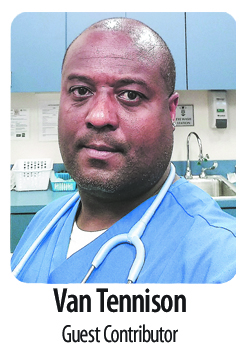LGBTQ Health Awareness Week set for March 21-25
From Staff Reports
The theme for the 20th annual National LGBTQ Health Awareness Week, March 21-25, is “Live Out Loud for LGBTQ Health,” the National Coalition for LGBTQ Health has announced. The point of the theme is to encourage everyone to speak openly about all aspects of LGBTQ health, according to a press release from the coalition, “providing an umbrella under which to discuss and raise awareness of mental health, transgender health and stigma reduction through accessible, affirming, inclusive and culturally-competent healthcare services for LGBTQ individuals.”
The theme was developed in part from responses to the coalition’s first State of LGBTQ Health National Survey, which included input from nearly 2,500 LGBTQ health providers and “highlights the most pressing healthcare issues faced by the LGBTQ community,” the press released noted. Findings from the survey are set to be released Tuesday, March during a webinar.
“Respondents indicated that the three most common problems LGBTQ patients contend with are mental health concerns, accessing gender-affirming care and stigma from healthcare professionals and society at large,” the press release continued.
The theme also “represents resistance to fear and shame by raising our collective voice against those telling us “don’t say gay,” the press release said, referring to recent anti-LGBTQ legislation passed in Florida: “Anti-LGBTQ ideology and stigma still remain embedded in our political, social, and economic structures. In Florida, the passage of HB 1557 limits students’ access to inclusive information about gender and sexual orientation as well as support services at school; providing gender-affirming care for youth under 18 is currently considered child abuse in Texas; nationally and globally, 2021 saw the highest rates ever recorded of violence against transgender people, including homicide; reproductive rights and sexual health services endure ongoing attacks; and LGBTQ people continue to bear a disproportionate burden of our healthcare system’s failures.”
The coalition will host several webinars during National LGBTQ Health Awareness Week, with registration open to the public. Those webinars include:
• “The State of LGBTQ Health: Insights from a National Survey of Healthcare Providers,” at noon (CT), Tuesday, March 22. Register at https://tinyurl.com/bdcmasz2.
• “Optimizing PrEP in Practice: Guidelines & Clinical Considerations” with free CME/CE available, on Thursday, March 24 at noon (CT). Register at https://tinyurl.com/5bvs6zws.
Among the coalition’s more than 240 partner organizations are AIDS Walk South Dallas and HELP Center for LGBT Health and Wellness. For more information, visit HealthLGBT.org.
……………..
Why you need a PCP
 As a community healthcare worker in Fort Worth, it is my duty and responsibility to educate the public regarding healthcare. I am mission driven to empower individuals with knowledge to navigate our complex health industry. This outreach effort is an effort of advocacy and community organization to assist everyone in making an educated decision for selecting and using a primary care provider efficiently, thus not over-utilizing our strained emergency room services.
As a community healthcare worker in Fort Worth, it is my duty and responsibility to educate the public regarding healthcare. I am mission driven to empower individuals with knowledge to navigate our complex health industry. This outreach effort is an effort of advocacy and community organization to assist everyone in making an educated decision for selecting and using a primary care provider efficiently, thus not over-utilizing our strained emergency room services.
It is essential that everyone has a primary care physician, or PCP. PCPs can help you order needed medical equipment, such as hospital beds, blood pressure cuffs, wheelchairs, adult diapers, breathing treatment machines and supplies, wound supplies and home health care.
PCPs will also manage your medications, help you prevent or control illness, manage specialists and referrals, follow up with you after an emergency room visit or a hospitalization handle services like diabetes and cancer screenings, diagnosis and treatment for acute injuries and sickness and management of long-term conditions.
There are a variety of doctors, some treat children; some treat adults, and some treat geriatric people. Internal medicine and pediatric specialists with training in both pediatrics and internal medicine. These doctors will keep shot records up to date, treat the entire family for illness, and make referrals to specialists when necessary.
Obstetrician-gynecologists specialize in women’s health issues and are sometimes PCPs for young women who have started menstruating or have needs that require watching.
Nurse practitioners or physician assistants sometimes are the main providers in a doctor’s office. Do not let the name nurse or assistant steer you away from these highly trained providers. They are dedicated to providing the same services as a medical doctor, such as prescription medications, referrals and preventing or treating illness for the entire family.
When should you go to your PCP? You should call your PCP first about any health-related questions or concerns that aren’t an emergency, including a high fever, ear pain, belly pain, a headache that won’t go away, a rash, mild wheezing or a lasting cough.
When in doubt, call your PCP. Even if the doctor isn’t available, someone else in the office can talk with you and help you decide whether you should go to the ER or urgent care. On weekends and at night, PCPs often have answering services that let them get in touch with you if you leave a message.
You should go to the ER if you: are having trouble breathing or are short of breath, have a change in mental status, such as suddenly becoming unusually sleepy or hard to wake, disoriented or confused; have a cut that won’t stop bleeding; have a stiff neck and a fever; have a rapid heartbeat that won’t slow down; ingest a toxic substance or too medicine, or have had more than a minor head trauma from a hard blow.
You should go to urgent care if you: have a fever but no rash; have persistent vomiting or diarrhea, have abdominal pain; have wheezing or shortness of breath; are dehydrated; have moderate flu-like symptoms; have a sprain or strain, or have a small cut that may need stitches.
To find a PCP, start by finding someone close to your home or work that takes your insurance.
Most insurance cards have a 1-800 number on the back of them; start by calling that number to see if your plan has directory of preferred PCPs.
Customer service is important, so consider the office’s resources such as food and clothing pantries and staff to help you with filling out forms electronically or on paper. Also consider how helpful and friendly the staff is, how easy it is to get in touch with the PCP and whether the office hours work with your schedule.
Ask for recommendations from friends, neighbors, relatives, and doctors or nurses you already know and trust. And find out about any extra services. Some offices include specialists, mental health providers, dietitians, lactation consultants, community healthcare workers and social workers on-site. It’s convenient to have all these services in one place.
To build a strong relationship with your PCP, start by being a “boy scout. That means be prepared for your appointment and never go empty handed. Take list of your current medications and take paperwork from any recent ER visit or hospital stays. Be prepared to describe any new symptoms you have or how a current treatment is affecting your daily life and any side effects you are experiencing from your current medications.
Prioritize the health issues you want to discuss, and be honest with your doctor. Follow all the COVID safety precautions when you visit, and take a companion with you when necessary. Be sure you understand your care plan and use your patient portal to communicate with your doctor. And follow your care plan.
Your health is in your hands, and while it may be easier to stay with one care provider, if you feel that you are not getting the right level of care, find a new PCP. Most importantly, establish care with a PCP of your choice immediately because you only get one life to live, and your healthcare team should want the best for you.

